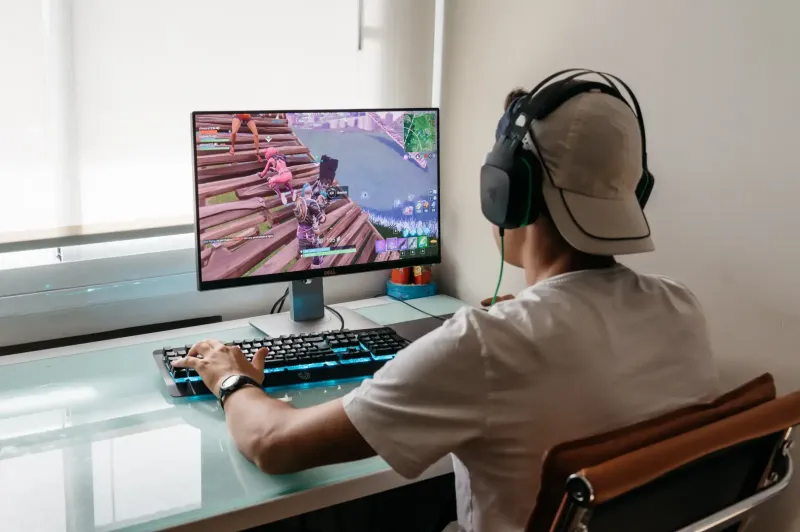
The Ultimate Guide to Building the Perfect Gaming PC
1.Understanding the Essentials of a High-Performance Gaming Computer
Gaming desktop components, gaming PC parts, and gaming hardware refer to the various components and specifications required to build or purchase a high-performance computer system designed for gaming. These include a powerful central processing unit (CPU), a dedicated graphics processing unit (GPU), ample system memory (RAM), a high-capacity and fast storage drive (such as a solid-state drive or SSD), a reliable power supply unit (PSU), and other components like a gaming-oriented motherboard and cooling system. Gaming PC requirements typically involve meeting or exceeding the recommended specifications for running the latest and most demanding video games smoothly, with high frame rates, detailed graphics settings, and minimal lag or stuttering. These specifications often include minimum and recommended CPU, GPU, RAM, and storage capacities, as well as specific hardware features or technologies that enhance gaming performance.
2.CPU: The Heart of Your Gaming Rig
When it comes to gaming, having a powerful CPU is crucial for optimal performance. The CPU, or central processing unit, is responsible for handling the game's instructions and calculations, making it a key component for smooth gameplay and high frame rates.
For gaming PCs, it's recommended to opt for a high-end CPU from reputable manufacturers like Intel and AMD. These processors are designed to handle demanding tasks and offer superior performance, ensuring that your games run smoothly, even with intense graphics and complex calculations.
Some of the best CPUs for gaming currently on the market include the Intel Core i9-13900K and the AMD Ryzen 9 7950X. These processors offer high core counts, impressive clock speeds, and advanced technologies that provide a significant boost in gaming performance.
3.GPU: The Powerhouse for Immersive Gaming Experience
When it comes to gaming, having a powerful graphics card is crucial for an immersive and smooth experience. The graphics processing unit (GPU) is responsible for rendering the visuals, textures, and effects that bring games to life. A high-performance GPU can handle demanding graphics settings, enabling gamers to enjoy games at their full potential with high frame rates, detailed textures, and advanced visual effects.
The choice of the best graphics card for gaming depends on several factors, including the resolution of your monitor, the types of games you play, and your budget. Generally, the latest generation of GPUs from NVIDIA and AMD offer the best performance for modern games. These include the NVIDIA GeForce RTX 40 series and the AMD Radeon RX 7000 series.
For high-end gaming at 4K resolution or with ray tracing enabled, the NVIDIA GeForce RTX 4090 or the AMD Radeon RX 7900 XTX would be excellent choices. If you're gaming at 1440p or 1080p resolutions, the NVIDIA GeForce RTX 4070 or the AMD Radeon RX 7700 XT can provide excellent performance while being more affordable.
It's also important to consider the power requirements and cooling capabilities of your gaming PC when choosing a GPU, as high-end graphics cards can generate significant heat and consume a lot of power.
4.RAM: Ensuring Smooth Multitasking and Responsiveness
When it comes to gaming PCs, the choice of RAM (Random Access Memory) can have a significant impact on overall system performance. High-performance gaming RAM is essential for providing the necessary bandwidth and low latency required for smooth gameplay, seamless multitasking, and efficient resource utilization.
The total capacity of RAM is also an important factor, as modern games and demanding applications often require larger amounts of memory to run efficiently. Opt for a minimum of 8GB of RAM, but 16GB or 32GB is recommended for a more future-proof and high-performance gaming setup.
By carefully selecting the right gaming RAM, users can unlock the full potential of their gaming PCs, ensuring a smooth and immersive gaming experience, as well as improved multitasking capabilities for other productivity tasks.
5.Storage: Balancing Speed, Capacity, and Performance
When it comes to gaming PCs, the choice of storage can have a significant impact on the overall performance and experience. Solid-state drives (SSDs) and traditional hard disk drives (HDDs) both have their own strengths and are suitable for different aspects of gaming.
SSDs offer lightning-fast data access and retrieval, making them the ideal choice for storing your operating system, games, and other frequently used applications. The near-instantaneous load times and reduced in-game loading screens enabled by SSDs can dramatically improve the overall responsiveness and immersion of your gaming experience. For gamers seeking the fastest possible storage solution, high-end NVMe SSDs are the way to go, providing even greater read and write speeds.
On the other hand, HDDs excel at providing large storage capacities at a more affordable cost per gigabyte. While they may not match the raw speed of SSDs, HDDs are well-suited for storing your game libraries, media files, and other less frequently accessed data. By reserving your SSD for your most important gaming files, you can strike a balance between performance and storage capacity.
Many modern gaming PCs utilize a hybrid approach, combining the speed of an SSD for the operating system and primary games with the expansive storage of an HDD for secondary games and media. This setup allows you to enjoy the best of both worlds, optimizing your system for both rapid responsiveness and ample storage space.








Showing 0 verified guest comments